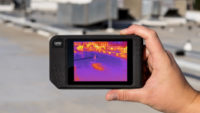Pandemic Pushes the Demand for Thermal Imaging Cameras
April 22, 2020
FLIR Systems and Seek Thermal, two manufacturers of thermal imaging equipment, are working overtime to meet demand for companies preparing to return to work. One essential criterion for reopening has emerged as the ability to detect body temperatures of workers, to prevent spread of the coronavirus. Oregon-based FLIR’s shares rose about 16 percent after Reuters reported that Amazon plans to use thermal cameras at its warehouses and Whole Foods stores, although neither FLIR not Seek were listed as the supplier.
Bloomberg reports that FLIR chief executive Jim Cannon noted that, “when the virus moved into Europe and North America, it was more Fortune 500 companies, hospital and healthcare networks and immediate needs from essential business that were required to operate.”

In addition to Amazon, General Motors also stated that it is using thermal scanners (but did not name the supplier). Thermal scanners “measure temperature on the skin’s surface using infrared light to create a thermal image,” and come in different versions, priced from $2,500 to $15,000.
Based in Santa Barbara, California, Seek Thermal is “a younger and much smaller company than FLIR … [that] focuses on lower-cost products, such as sensors that can be installed and used without training.” “We have been inundated,” said Seek Thermal cofounder Bill Parrish, who noted some of the calls are “coming from larger Fortune 500 companies.” “They are doing demos and evaluations to help them open up their factories,” he said.
Prior to the coronavirus, most demand for thermal imaging came from the military and “government authorities for use in border checks.” Supply-chain data compiled by Bloomberg revealed that, “about a third of FLIR’s revenue comes from the U.S. government.” In 2019, the company posted $1.89 billion in sales.

Cannon, speaking on a February earnings call, said he “didn’t expect COVID-spurred demand for thermal cameras to be a ‘needle mover’ for the company.” William Blair & Co. analyst Louie DiPalma noted that, “it is likely that thermal cameras will be more commonly used as a screening device for large gatherings” going forward. Both FLIR and Seek Thermal’s executives said they are confident they can scale up — with some caveats.
“If overnight huge industries place huge orders, that certainly will take time to satisfy those orders,” said Cannon, who added that his company is “prioritizing sales to healthcare providers and essential businesses.”
Due to an IP-sharing arrangement with Raytheon Technologies and NXP Semiconductors, Seek Thermal has “some supply chain flexibility … [although] building the equipment’s core or chip set takes time.” “The problem is that when this pandemic turned up and you open the valve and say you want these tomorrow, you’re actually many months away,” Parrish said. “So it comes down to how many units you had in your inventory.”
Both Cannon and Parrish also warned that their devices only measure a body’s temperature. “Thermal imaging is not a panacea for determining whether or not you have a fever or whether or not you have COVID-19,” said Parrish.

No Comments Yet
You can be the first to comment!
Sorry, comments for this entry are closed at this time.